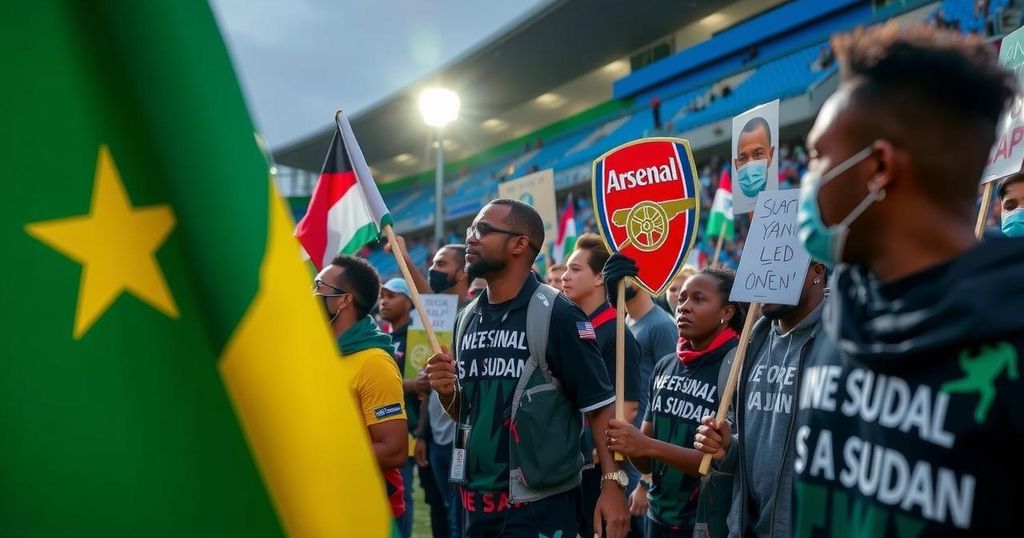UK activists protest outside Emirates Stadium, urging Arsenal F.C. to end its sponsorship with Emirates Airlines due to alleged UAE complicity in the humanitarian crisis in Sudan, particularly in El Gezira. They highlight alarming violence and accuse the UAE of profiting from the conflict by supporting the RSF. Activists assert that Arsenal’s partnership with Emirates implicitly connects the club to these atrocities, prompting a call for accountability from fans and the general public.
Activists from London For Sudan and Action For Sudan convened outside the Emirates Stadium during the highly anticipated match between Arsenal and Liverpool to protest Arsenal F.C.’s ongoing sponsorship agreement with Emirates Airlines. They are urging the football club to sever its ties with the airline, citing the United Arab Emirates’ (UAE) alleged complicity in the deteriorating humanitarian situation in Sudan. In a collective statement released on the eve of the protest, these organizations expressed their grave concerns over a recent surge in violence in El Gezira, linking it to the recent defection of the paramilitary Rapid Support Forces (RSF) commander, Abu Agla Keikil, and his troops to the Sudanese Armed Forces (SAF). The statement highlighted alarming statistics, with reports indicating that over 500 individuals were reportedly killed within a span of just two days in a single village, alongside 37 reported cases of rape around Rufaa in El Gezira state. It was noted that approximately 130 Sudanese women are believed to have taken their own lives to escape RSF atrocities. Residents of El Gezira have previously raised concerns about potential retaliation from RSF forces, inciting fears of a relentless cycle of revenge and escalating civil unrest. The groups assert that the UAE is exacerbating the conflict by supplying arms to the RSF, a claim that has garnered support from various stakeholders and activists. This accusation was also supported during the United Nations Security Council’s 9,611th meeting in April by Sudan’s Permanent Representative, El Harith Idriss Mohamed, who pointedly accused the UAE of involvement in the conflict. However, the UAE has firmly rejected these allegations, dismissing them as “baseless”. The activists further contend that the UAE, as the owner of Emirates Airlines, is profiting economically from the ongoing violence through the acquisition of Sudan’s natural resources in exchange for its support of the RSF. They argue that Arsenal F.C.’s continued association with Emirates Airlines effectively links the football club to these heinous crimes. “Arsenal’s continued partnership with Emirates Airlines implicitly links the club to these atrocities,” the groups argued, accusing the UAE of engaging in what they termed “sportswashing genocide in Sudan.” The protestors appealed to Arsenal fans and the broader public to advocate for the cessation of the Emirates sponsorship, encouraging them to “take a stand for Sudan” by signing petitions and holding the football club accountable for its affiliations.
The situation in Sudan has been increasingly dire, particularly in regions like El Gezira, where violence has surged amidst internal power struggles involving various armed factions, notably the RSF and the Sudanese Armed Forces. The UAE’s alleged role in supplying arms has raised alarms among international observers and human rights activists, particularly in light of the country’s expanding economic interests in Sudan, which they assert may be driving its support of the RSF. The protests at Arsenal F.C. reflect broader concerns over corporate affiliations with entities seen as complicit in human rights violations, raising questions about the ethical responsibilities of large organizations in times of international crisis and conflict.
The protest against Arsenal F.C.’s sponsorship deal with Emirates Airlines represents a significant intersection of sports, ethics, and international humanitarian concerns. The activists’ claims regarding the UAE’s alleged involvement in the Sudanese conflict underline the complexities of corporate sponsorships in sports, as well as the responsibilities that come with them. As these allegations intensify, the call for accountability and moral clarity in corporate partnerships grows louder, urging organizations to consider the social implications of their business associations. The situation remains fluid, and the activism surrounding these issues emphasizes the potential for sporting institutions to play a crucial role in advocating for human rights and ethical practices globally.
Original Source: www.dabangasudan.org






